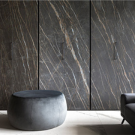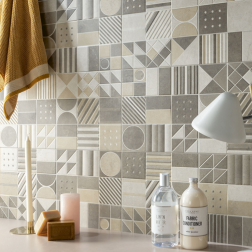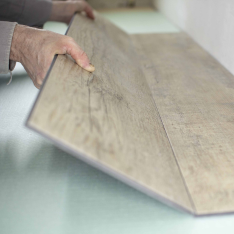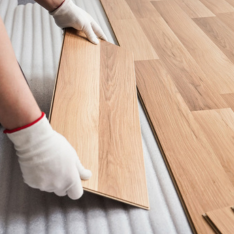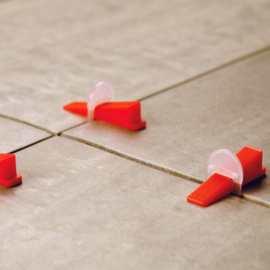When talking about porcelain stoneware, you often hear that it is an "indestructible" material. But what does this statement really mean? It's important to uncover the truth behind this popularity and understand the real characteristics of this material. In this article, we will explore the properties of porcelain stoneware, the myths associated with its indestructibility, and tips for its maintenance.
What is porcelain stoneware and why is it so popular
Porcelain stoneware is a ceramic material obtained through a high-temperature firing process. This material is composed mainly of clays, feldspars, and silica sands, which, once fired, become incredibly hard and densely compacted. Its popularity is attributable to several factors.
Advantages of porcelain stoneware
- Versatile aesthetics. Porcelain stoneware is available in a wide range of colors, textures, and finishes, making it suitable for any decor style. It can imitate wood, stone, and even cement.
- Ease of maintenance. Thanks to its non-porous surface, porcelain stoneware is stain-resistant and easy to clean, making it ideal for environments like kitchens and bathrooms.
- Resistance to external agents. This material is highly resistant to water, heat, and weather, which makes it suitable for both indoor and outdoor use.
Common Applications
Porcelain stoneware finds application in a wide range of contexts, including:
- Flooring. Ideal for high-traffic areas like shops and offices.
- Wall coverings. Perfect for bathrooms and kitchens thanks to its moisture resistance.
- Gardens and terraces. Outdoor porcelain stoneware is designed to withstand extreme temperatures and exposure to weather agents.
The combination of these factors has helped make porcelain stoneware one of the most chosen materials for modern architecture and interior design.

The characteristics that make porcelain stoneware resistant
Porcelain stoneware is often considered resistant for a number of reasons. Here are some of its main characteristics:
Density and hardness
Porcelain stoneware is extremely dense and hard. This density comes from firing at high temperatures, which compacts the particles of clay and other materials. This characteristic allows porcelain stoneware to resist scratches and impacts, making it ideal for domestic and commercial environments.
Water resistance
One of the most appreciated qualities of porcelain stoneware is its water resistance. Its non-porous surface prevents moisture absorption, reducing the risk of mold and bacteria. This makes it an excellent choice for bathrooms and kitchens, where humidity is frequently high.
Dimensional stability
Porcelain stoneware maintains its shape and dimensions even in extreme temperature conditions. This dimensional stability is fundamental for installation in outdoor areas, where the material is exposed to thermal changes. Furthermore, it does not deform or swell, ensuring long-lasting durability.
Is porcelain stoneware truly indestructible?
Despite the numerous qualities of porcelain stoneware, there are some myths that need to be debunked. It's important to clarify these misunderstandings to have a realistic view of its technical performance.
Myth 1: Indestructible means it never breaks
Many believe that porcelain stoneware is completely immune to breakage or cracks. Although it is a very resistant material, it can still break if subjected to excessive loads or violent impacts. For example, a heavy object falling on a tile can cause damage.
Myth 2: It requires no maintenance
Although porcelain stoneware is easy to clean and stain-resistant, it is not maintenance-free. It's important to perform regular cleaning and, if necessary, apply specific products to maintain its original appearance. Ignoring maintenance can lead to surface deterioration over time.
Myth 3: It's suitable everywhere
Another common myth is that porcelain stoneware can be used in any environment without specific considerations. In reality, there are applications where it is more suitable and others where it might not be the best choice. For example, in very cold environments, parquet flooring might be more suitable.
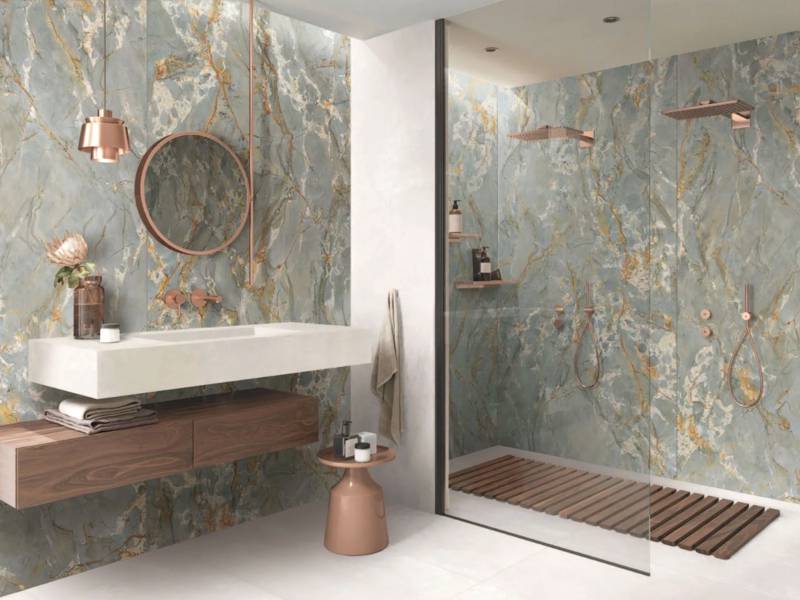
Resistance tests: how truly indestructible is porcelain stoneware?
To evaluate the real resistance of porcelain stoneware, it's fundamental to consider the standardized tests performed on this material. These tests help determine its ability to withstand different conditions.
Hardness test
One of the most common tests is the Mohs hardness test, which measures scratch resistance. Porcelain stoneware scores 6-7 on this scale, which means it is resistant to scratches caused by common objects.
Absorption test
The water absorption test determines how much moisture porcelain stoneware can absorb. Good porcelain stoneware has an absorption rate of less than 1%, making it extremely resistant to moisture.
Impact resistance test
Impact resistance tests measure the ability of porcelain stoneware to withstand impacts. High-quality materials can withstand significant blows without breaking, while lower-quality ones may not have the same resistance.
The weaknesses of porcelain stoneware: when it can get damaged
Although porcelain stoneware is a robust material, it has vulnerabilities that are important to know. Here are some scenarios where porcelain stoneware can get damaged:
Violent impacts
Although porcelain stoneware is resistant, violent impacts can cause breakage. It's important to be careful with heavy or sharp objects that might fall onto porcelain stoneware tiles.
Extreme temperatures
Prolonged exposure to extremely low or high temperatures can compromise the integrity of porcelain stoneware. It is advisable to avoid using porcelain stoneware materials in environments where temperatures can vary drastically.
Cracking due to freezing
In cold climates, water can seep between the tiles and freeze, causing cracks. To prevent this problem, it's important to perform a correct installation and use high-quality grout.
Tips for keeping porcelain stoneware in excellent condition
To ensure that porcelain stoneware maintains its appearance and functionality over time, it's fundamental to follow some simple maintenance tips:
Regular cleaning
Perform regular cleaning using neutral detergents. Avoid harsh chemicals that could damage the surface. For daily cleaning, a damp cloth and a mild detergent are more than sufficient.
Checking the grout lines
The grout lines between tiles can accumulate dirt and moisture. It's important to regularly check and clean these areas to prevent mold growth. If you notice the grout is damaged, consider repairing it.
Protection from scratches
Use rugs or felt pads under furniture to protect porcelain stoneware from scratches and marks. For heavy furniture, consider using wheels or supports to distribute the weight evenly.
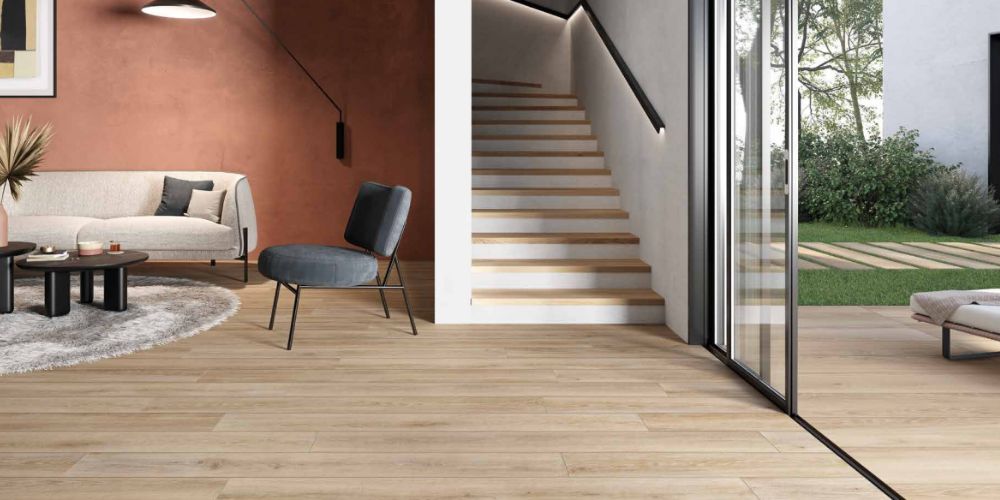
When to choose porcelain stoneware for your home
Choosing porcelain stoneware for your home depends on various factors. Here are some aspects to consider:
Usage environment
Porcelain stoneware is ideal for high-traffic areas, such as entrances and living rooms. It's also an excellent choice for kitchens and bathrooms thanks to its water resistance and non-slip finish.
Style and design
If you are looking for a versatile material that adapts to different decor styles, porcelain stoneware is an excellent choice. Available in many finishes and colors, you can easily find the one that best suits your home.
Budget
Consider your budget when choosing porcelain stoneware. Although there are budget-friendly options, investing in high-quality tiles can guarantee greater durability and lower maintenance costs in the long run.
The latest innovations in the field of porcelain stoneware
The porcelain stoneware sector is constantly evolving, with new technologies and designs emerging regularly. Here are some of the latest innovations:
Sustainable production
Many manufacturers are adopting sustainable production practices, using recycled materials and low environmental impact technologies. This is a positive step towards reducing the ecological impact of porcelain stoneware.
Custom design
Customization has become a popular trend. Thanks to advanced technologies, it is possible to create custom-made porcelain stoneware tiles, adapted to specific aesthetic and functional needs.
Surface innovations
New surface treatment technologies further improve the resistance and durability of porcelain stoneware. Some treatments make the material even more resistant to stains and chemical agents, extending its useful life.
Conclusion: porcelain stoneware is resistant but not indestructible
In conclusion, it is an excellent material for many applications thanks to its resistance and versatility. However, it's fundamental to remember that porcelain stoneware is not indestructible. Understanding its characteristics, myths, and limitations can help you make informed decisions for your home.
If you are considering using porcelain stoneware, make sure to follow the maintenance tips and choose the type most suitable for your needs. With the right care, your porcelain stoneware will remain beautiful and functional for many years to come.




